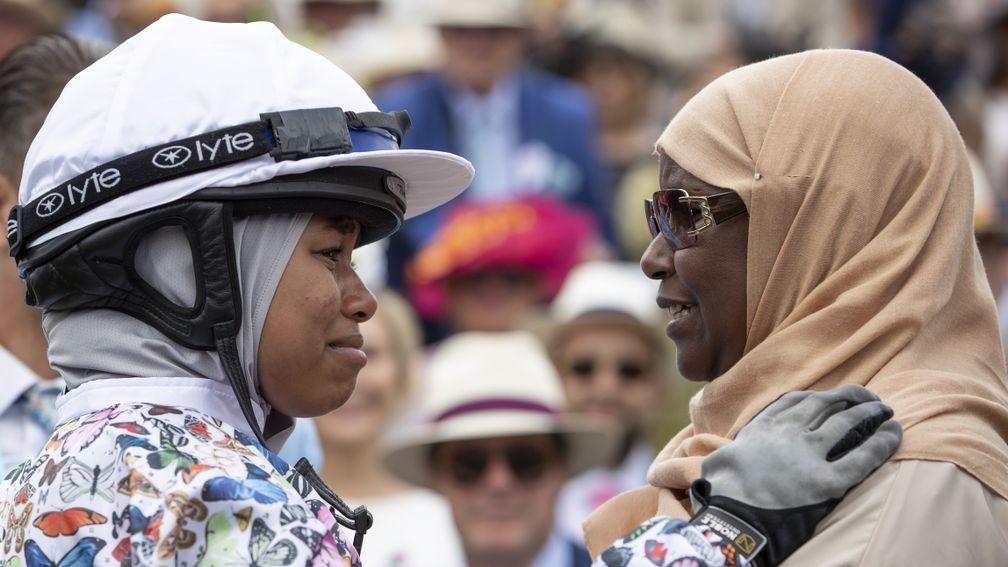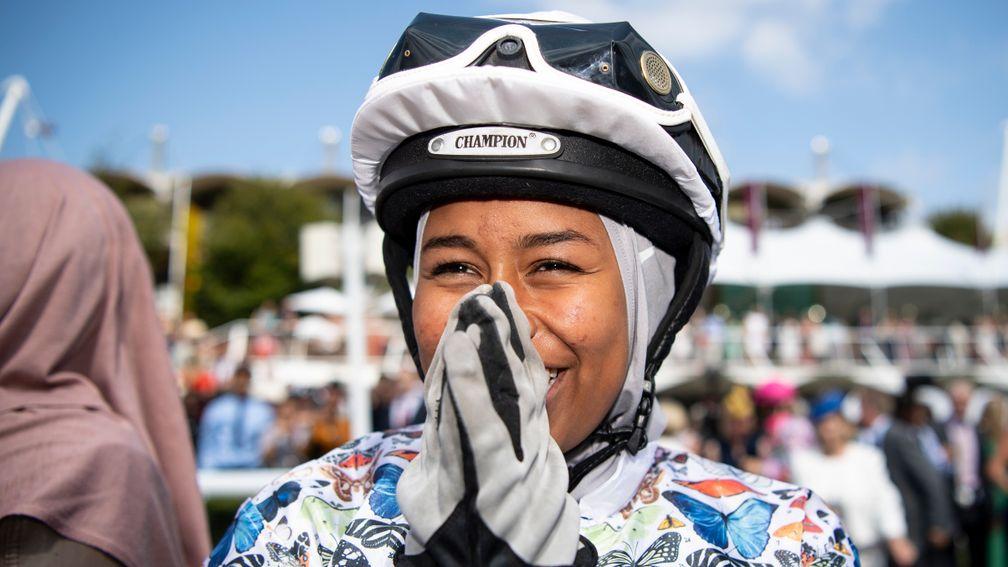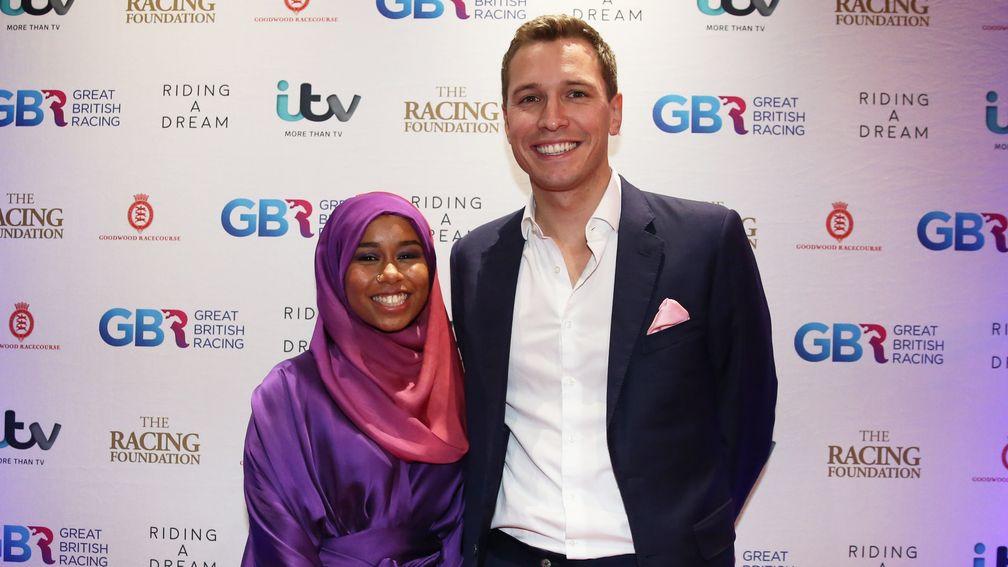Khadijah has done her job - now we must do ours by reaching out

I sincerely hope you were one of the 1.1 million people who tuned into Riding A Dream, which told the story of Khadijah Mellah's journey to a ground-breaking victory in Goodwood's Magnolia Cup, on ITV recently.
My involvement with this project means a lot and I am delighted to take this chance to share the experience with you.
It has been a crazy week, from the premiere at the Ritzy in Brixton last Monday, attended by the Duchess of Cornwall; a media tour promoting the film that included an appearance on Good Morning Britain and then watching the film on ITV immediately after the Rugby World Cup final.
I don’t think any of us thought we would be in this position when I initially suggested the idea. I must thank Great British Racing, The Racing Foundation and Goodwood for their support from the outset, as well as Niall Sloane and the team at ITV, who all believed in the project from day one. It has been some ride.
Before this all began, I had never met Khadijah Mellah, the young Muslim woman who won the Magnolia Cup at the Qatar Goodwood Festival as the first person in Britain to ride in a race wearing a hijab.
However, I had already been involved with the Ebony Horse Club in Brixton for about 12 months as a patron of the charity. It is an incredibly diverse organisation which touches the lives of so many wonderful children and families, all with different stories to tell. The common ground is not horseracing, it is horses.

Khadijah fell in love with horses after watching the Disney film ‘Spirit’. But it was only when seeing a flyer in Brixton about Ebony that she realised it was possible for horses to become a huge part of her life.
Khadijah is the star of Riding A Dream. Due to her determination, focus and attitude, she was able to achieve something that, at a variety of different stages, felt impossible.
As I hope you saw in Riding A Dream, Khadijah failed her first riding assessment. That setback came in Royal Ascot week – just five and a half weeks before the race. That night, she rang me up in floods of tears, but she ended the conversation determined to “prove people wrong”.
Perhaps it was when she was awarded her black belt in karate, or perhaps when she learnt to box in Dwaynamics Boxing Gym next to Ebony, that she learnt to pick herself up off the canvas so impressively. Either way, she did.

Anyone who has watched the film will know how just impressive a young woman Khadijah Mellah is. But the truth is that there are 150 other Khadijahs at Ebony Horse Club alone, a similar number at the Urban Equestrian Centre in Leicester run by Freedom Zampadalus, and younger children who have developed a love of horses at Park Palace Ponies in Liverpool. I could go on.
It is my heartfelt wish that more people in racing become aware of the Ebony Horse Club and similar organisations – greater awareness is needed of these amazing, urban riding centres because genuine good can come of it.
I spoke to Freedom about this. “Horses have an aura and children will be hooked if we can get them to engage with horses,” he said. “It’s like Lewis Hamilton, you put him in a car and look at the results, the same with Serena Williams, a girl from Compton [a city in California with poverty issues and high crime-rates] who was given a tennis racket and became an icon.

“Passion outweighs talent: give kids the opportunity to do something they love – or potentially could love – and incredible things can happen.
“People that we are dealing with here at the Urban Equestrian Academy are the underdogs in life: they are expected to lose, they’re not expected to win. We come from a place of failure, so anything is a bonus, but if you give us an opportunity, you will see how we excel. You will see how we grab it with both hands.”
Being on this journey from the start with Khadijah has been hugely enlightening and rewarding. I have gained a friend who, I have no doubt, will continue to achieve remarkable things. But I have also enhanced my belief that racing needs to do a lot more to reach areas we haven’t reached before.
I went back to Ebony a few days after Khadijah’s victory. I saw her teaching six children of different races and religions how to hold the reins on an equicizer and how to stand up in the saddle “like a jockey”. Those young men and women have a role model now: it is not Frankie Dettori, it is Khadijah.
I have spoken to a number of different people within racing – many in high powered roles – and I do get a sense that there is a genuine desire to build on this and change the game. So, if that is the desire, then let us get it done!
My Mum is a teacher in a multi-cultural primary state school in Catford. About a year ago, she asked me to come and talk to her class about my job and horseracing. When I arrived, the class weren’t particularly interested (I don’t blame them, I remember those talks from my school days) but I played them a video of the jockey-camera footage of a horse race and the shift in the room was amazing.
Genuinely, their eyes lit up. They were then asking questions and wanting to know all about racing – “where can I try that?”

By heading into these vibrant, amazing riding centres or schools in areas where racing is not part of the conversation, we can share our passion and the word might spread. Horseracing might be talked about in one classroom and then another. The results may not be quantifiable by clicks on an Instagram page, or views of the latest promotional campaign for British racing, but the word will slowly get out about how great a thrill horseracing is.
It's also crucial that, when we discuss how to progress and change for the better, the people we speak to are not insiders, already involved in the sport. In board meetings and talks, people with similar perspectives as Khadijah or Freedom simply must be included.

Personally, I cannot speak for them and their communities, but I urge they be given a voice because, if we want to increase awareness of our sport, we need to truly understand what is needed for that change to occur in other hearts and minds. And the only way that can happen is by listening to newcomers, outsiders to whom we can give a budding interest which grows and grows.
For those of us at the heart of the project, such as my brother Philip and Riding A Dream’s directors Tommy Bolwell and Mattia Reiniger, we needed a lot to happen for this amazing story to be told. At every turn the answer was always ‘yes’. This story would not have happened if at any of those stages the answer was ‘no’. This is a lesson we should heed.
Riding A Dream has transcended our little racing bubble and is a story that has had an aggregate readership of over four billion people. If we are truly serious about making a positive change to this great sport, about becoming more diverse and inclusive, so that the sport fits into the modern landscape in which it resides, we all need to collectively start saying ‘yes’ more often.
When Khadijah went to Jim Boyle’s yard in Epsom back in April to sit on a racehorse for the first time, she didn’t ask to become a role model, she didn’t ask to become an ambassador for our sport. But, because she was given a chance, because collectively the sport pulled together, something really amazing happened.
Khadijah has done her job and now it is time for us to do ours.
Riding A Dream will be repeated on ITV at 10.45pm on Monday and is available to watch on the ITV Hub.
Oli Bell has donated the fee for this column to Ebony Horse Club.
The Lowdown from 8.30am daily on racingpost.com and the Racing Post app for all the day's going updates, news and tips
Published on inComment
Last updated
- How Santa Anita's heroic support to LA fires reminded us how crucial racecourses remain to all walks of life
- We know that times are tight - but racecourses really do need to step up and improve outdated weighing rooms
- The budget has heaped even more trouble on racing - and I fear many trainers will now decide the numbers just don't add up
- Why I think Cheltenham Festival handicaps need to change - JP McManus writes exclusively for the Racing Post
- No-one has ever emerged from the womb wearing a trilby - racing's future survival hangs on pursuing a young audience
- How Santa Anita's heroic support to LA fires reminded us how crucial racecourses remain to all walks of life
- We know that times are tight - but racecourses really do need to step up and improve outdated weighing rooms
- The budget has heaped even more trouble on racing - and I fear many trainers will now decide the numbers just don't add up
- Why I think Cheltenham Festival handicaps need to change - JP McManus writes exclusively for the Racing Post
- No-one has ever emerged from the womb wearing a trilby - racing's future survival hangs on pursuing a young audience
